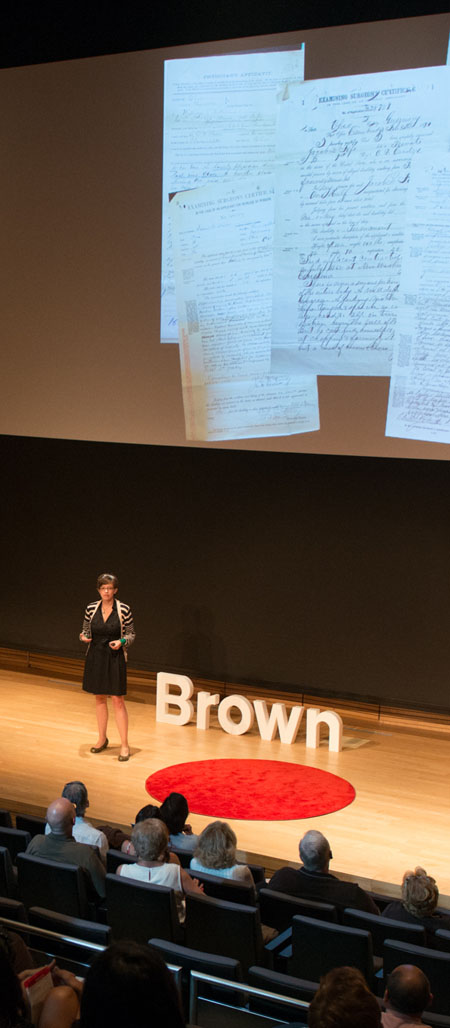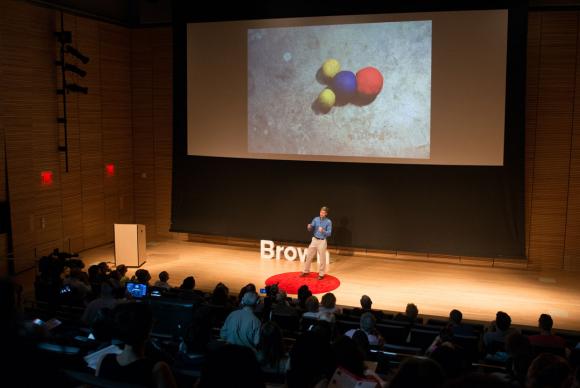PROVIDENCE, R.I. [Brown University] — Few occasions bring scholars of the classics, chemistry, English, and pathobiology to the same stage, but when the Brown University Graduate School asked students and alumni to explain why research matters, such a variety stood up to answer.
For many of the 10 speakers at the symposium of the 250th Anniversary Fall Celebration Sept. 27, 2014, the answer seemed to be that research provides us the wisdom to endure and confront our shared existence as fragile, mortal beings. Drawing on 2,000 years of history and the latest science, students provided deep insights from clearly distinct perspectives for an appreciative audience in the Granoff Center for the Creative Arts.
American studies graduate student Ashley Bowen-Murphy showed that we’ve long understood how the horrors of war continue to injure soldiers — and their families — after they’ve returned. In the pension records of Civil War veterans, she’s examined how an increased rate of heart problems among returning soldiers led Philadelphia physician Jacob Da Costa to create the diagnosis “irritibale heart.” Earlier this year, she said, the U.S. Department of Veterans Affairs issued a report acknowledging the issue anew.
“Jacob Da Costa totally knew this,” she said. “So what my research does is to try to think through the ways in which medical history can tell us something about what we’re still seeing in the present.”
Classics student Tara Mulder and English student Jessica Tabak explained other ways that consulting history can provide us with new tools for understanding our current health struggles and questions.
Mulder noted that ancient Greek doctors like Galen asked much the same questions of fetal existence (e.g. when does life begin?) that remain burning but unresolved today. In parallel, she’s finding that in all their zeal to comprehend the fetus, scholars through much of history have rarely devoted a similar degree of concern to the pregnant woman, upon whom it utterly depends.

Pension records of Civil War veterans, graduate student Ashley Bowen-Murphy showed, can teach us a lot about present-day veterans affairs.
Tabak, meanwhile, investigates how we’ve always created stories to cope with the painful arbitrariness of illness. Today we frame disease as a struggle that we will overcome and become stronger for having beaten. But in Renaissance England, when medicine offered less hope, a different kind of narrative served that same psychological need. People sought to derive divine meaning or blessings from their ailments. Much of her work has focused on the timeless honesty of The Devotions, in which the writer John Donne presented such a narrative but struggled to take comfort in it.
Applying science
While humanities research can restore the collective insights we’ve produced through the ages regarding our human condition, science allows us to confront illness head on, now or in the future. The scientists at the symposium described ways they do that.
Pathobiology student Stephen Zins explained his investigation of the immune system’s interaction with polyomaviruses. These pervasive pathogens are harmless to the healthy but are scourges to those with imperiled immune systems such as the 35 million people on Earth with HIV or many others being treated for autoimmune disorders.
Eric James, a neuroscience student, discussed his research on the apparent connection between an antiseizure medication sometimes taken during pregnancy and neurodevelopmental disorders including autism. He uses tadpole models to illuminate how this may happen in hopes of finding a way to reverse or prevent it.
The research of molecular pharmacology and physiology student Lauren Quattrochi tackles a broader subject with uniquely deep roots at Brown. Working with David Berson, professor of neuroscience, who in 2002 discovered a new type of light-sensitive cell in the eye, she is studying a subtype of those cells that she discovered. Its function isn’t yet known but research in this area may have direct implications for light-related conditions such as seasonal affective disorder, some forms of insomnia, and jet lag.
Unique paths
Some research didn’t touch on health, but no one would question that these other projects matter just as much. Referencing political controversy in Texas in 2010 over changes to the content of social studies textbooks, political theorist Matthew Lyddon is working on an approach to civic education policy which gives students their own stake in their development as citizens and in making sense of competing moral and political values and interpretations.
And chemist Vale Cofer-Shabica cleverly used a stop-motion video of clay balls to illustrate his work to understand and model an entirely new kind of chemical reaction. First noted in formaldehyde, this surprisingly common reaction involves atoms that seem to wander inefficiently before forming their new bonds.
The idea of taking an unusual path served as an inspiring metaphor for the talks by two alumni, Sophie Lebrecht (Ph.D. 2012) and Shankar Prasad (Ph.D. 2006). They both followed entrepreneurial instincts to make their research matter beyond academia.
Lebrecht turned her cognitive science research on how people respond when they see images into a business, Neon Labs, that algorithmically picks the most compelling frame from an online video. That frame, used to display the video in Web pages or apps, can entice viewers to become more likely to click.
Lebrecht recalled how Peter Weber, professor of chemistry now dean of the Graduate School, encouraged her to set out as an entrepreneur when she worried about leaving academia.
Alumnus Shankar Prasad, who studied political science, worked in finance and then founded an international medical data startup before forming the Governance Lab at New York University. Now he studies how technology can change citizen engagement and therefore make governance more effective and legitimate.
Such applications of research in the real world are vital, said Brown Provost Vicki Colvin in her introduction of the symposium, moderated by biology graduate student Heather Bennett.
“In the last century, universities were places apart,” she said. “They were places where scholars went to think. The term ‘Ivory Tower’ was perhaps an apt one for many centuries. But certainly in this day and age, being an ivory tower doesn’t work anymore. If you do that, people don’t know why they are funding science and engineering research if they don’t see a direct outcome on their lives. Or they might wonder what the value is of liberal arts and why it is we need to think deeply about the nature of people and how they interact.”
The symposium, however displayed the relevance of research with abundance and variety.

